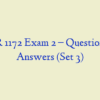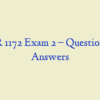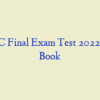Description
BA 3200 Final Exam – Question and Answers
- Producing what the buying public wants may not be the same as producing what the entirety of society needs. The argument is essentially making a normative judgment on the basis of some assumed but unproved moral standards.
- “It might be true that society as a whole would benefit by having some group discriminated against” is a/an __________ argument for discrimination.
- The Marxist view that history is determined by changes in the economic methods by which humanity produces the materials on which it must live is called free enterprise.
- Environmental damage inevitably threatens the welfare of human beings as well as plants and animals. Threats to the environment come from two sources: pollution and resource depletion.
- Rawls would argue that it is unjust to give some people more opportunities than others.
- Modifying Locke’s views on free markets, Adam Smith’s arguments rest on __________ arguments that unregulated markets and private property will produce greater benefits than any other system.
- A program designed to ensure that jobs of equal value to an organization are paid the same regardless of external labor markets is called __________ __________ __________.
- __________ is the last of Kohlberg’s stages of moral development (also known as part of the post-conventional level).
- The bearing of external costs of pollution largely by those who do not enjoy a net benefit from the activity that produces the pollution is called __________ __________.
- The most common criticism of advertising concerns its effect on the consumer’s beliefs.
- Acid rain is caused by:
- Commercial extortion occurs when an employee accepts something of value by a person outside the employee’s company who intends it to lead the employee to deal favorably with that person or the person’s firm.
- Goods valued only because they lead to other good things are called __________ __________.
- A firm’s organizational chart, identifying the formal and informal hierarchies of authority, exemplifies the fundamental reality of the organization.
- The “Loyal Agent Argument” states: An employer would want to be served in whatever ways will advance his or her self-interests. Therefore, as a loyal agent of his or her employer, the manager has a duty to serve his or her employer in whatever ways will advance the employer’s self-interests.
- __________ is the effect, according to Marx, of capitalist systems which do not allow the working class to develop their productive potential or satisfy their real human needs.
- Efficiency means producing desired __________ with lowest resource __________.
- Job risks are not justified when labor market are __________ and risks are __________ and uncompensated.
- Few businesses maintain that the socially responsible course to take is the utilitarian one with the lowest net costs.
- Compensatory justice is the belief that persons should have restored to them what they lose as the result of another’s wrong action.
- Proponents of the Antitrust view argue that prices and profits in highly concentrated industries are higher than they should be. By breaking up large corporations into smaller units, they claim, higher levels of competition will emerge in those industries.
- Few views of deep ecology are unusual and/or controversial.
- Lawrence Kohlberg identified twelve stages of moral development.
- The model of business organizations which defines them as structures of formal relationships designed to achieve a technical or economic goal with maximum efficiency; often associated with a firm’s organizational chart is called the __________ model
- Rule utilitarianism looks only at moral rules of a particular action.
- Conflicts of interest arise when employees have a private interest in the outcome of a task in which they are engaged in that is possibly antagonistic to the firm’s interests and substantial enough that it might affect the employee’s independent judgment on the firm’s behalf.
- Intentional discrimination is discrimination that is the result of the actions of all or many of the people in an institution and of their routine processes and policies.
- A __________ __________ __________ that allows private control of productive property is the basis of alienation and great inequalities.
- The duty of a seller not to take advantage of gullibility, immaturity, ignorance, or any other factor that might reduce the buyer’s ability to make a rational choice is called duty not to __________.
- In a perfectly free economy, all buyers and sellers are utility maximizers: Each tries to get as much as possible for as little as possible.
- The release of CFCs into the atmosphere may lead to several hundred thousand new cases of skin cancer each year and destroy many valuable food crops. Also, ocean plankton–on which the entire ocean’s food chain depends–may be severely damaged. This is referred to as:
- The common definition of price fixing is:
- Intrinsic goods are things that are desired for their own sake, such as health and life.
- Whistle blowing–the attempt by an employee to disclose wrongdoing in an organization–can take two forms.
- Employees’ rights to privacy must be balanced against employers’ rights to know certain information about their activities.
- The __________ __________ is the necessity of moral principles to be applied the same way to everyone in similar circumstances.
- Potential conflicts of interest may or may not be ethical, depending on the probability that the employee’s judgment will be affected by the conflict of interest.
- In the eyes of the Justice Department and nineteen states, Microsoft is not considered a monopolistic corporate bully.
- The point at which the amount of goods buyers want to buy exactly equals the amount of goods sellers want to sell, and at which the highest price buyers are willing to pay exactly equals the lowest price sellers are willing to take is called the __________ __________.
- Negative rights are defined entirely in terms of the duties others have not to interfere with you.
- Research has shown people are irrational and inconsistent when weighing choices based on probability estimates of future costs and payoffs.
- According to Smith, when private individuals are left free to seek their own interests in free markets, they will inevitably be led to further the public welfare by an “invisible hand.”
- Immanuel Kant’s principle, called the categorical imperative, requires that everyone be treated as:
- The basic problem underlying the views of the social Darwinist is the fundamental normative assumption that survival of the fittest means survival of the best.
- In a monopoly, there is only one seller, but other sellers can enter the market.
- An indication of discrimination exists when a disproportionate number of a certain group’s members hold less desirable positions despite their preferences and abilities.
- Smith’s utilitarian argument is most commonly criticized for making what some call unrealistic arguments.




